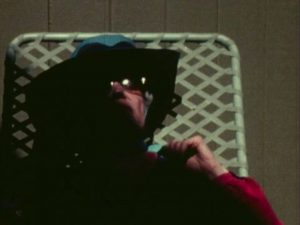From the Chicago Reader (May 1, 1990). — J.R.
The four films to date of independent Chicago filmmaker Peter Thompson form two diptychs: not films to be shown simultaneously side-by-side, but successive works whose meanings partially arise out of their intricate inner rhymes and interactions. Two Portraits (1982), which has already had limited exposure in Chicago, describes the filmmaker’s parents: Anything Else, devoted to his late father, combines stop-frame images of the latter, in an airport and outdoors, with a painful recording of his voice taken in a hospital and a multifaceted verbal portrait delivered by his son; Shooting Scripts juxtaposes the filmmaker’s mother, Betty Thompson, reading from her own diaries with a minimalist view of her sleeping on a beach chair, alternating stop-frames with privileged moments of movement. Together these films create a rich tapestry, but the more recent hour-long pair, Universal Hotel and Universal Citizen (1987), receiving its premiere here, creates a still more ambitious and dense interweaving of objective and subjective elements. As Thompson puts it, this diptych deals with three main themes: the emotional thawing of men by women, the struggle to disengage remembrance from historical anonymity, and nonrecoverable loss. In the first film, Thompson describes his involved research about medical experiments in deep cold conducted on a Polish prisoner and a German prostitute by Dr. Sigmund Rascher at Dachau in 1942; photographs culled from seven archives in six countries, as well as a subjective dream set in the Universal Hotel, form the main materials. In the second film, the filmmaker’s offscreen meetings with a Libyan Jew and former inmate of Dachau who works as a smuggler in Guatemala yield a complex personal travelogue that leads us not only to the Universal Hotel (a real place, as it turns out), but also to the public square in Siena that appears at the beginning of the first film. These are all films that have grown out of years of reflection, and Thompson’s background as a still photographer serves him well in his haunting and original historical meditations; these works reverberate powerfully with a sense of the passage of time and the mysterious coalescence of disparate strands in a varied life. (JR)


